Here’s the verdict from the Wall Street Journal‘s Walt Mossberg on the 3G iPhone, which comes out tomorrow morning. The two most noteworthy observations are that (a) email and internet surfing is between three and five times faster as it is with the older AT&T network to which the first iPhone was limited”, and (b) in Mossberg’s own testing, the iPhone 3G’s “battery drained much more quickly in a typical day of use than the battery on the original iPhone, due to the higher power demands of 3G networks.”
Six more observations: (c) “Apple’s exclusive carrier in the U.S., AT&T Inc., has effectively negated the iPhone’s up-front price cut by jacking up its monthly fee for unlimited data use by $10, and if you want text messaging, the cost rises further — $5 bucks for 200 monthly messages, or another $120 over the two-year contract”; (d) the main stylistic main difference is the back, which is “now plastic instead of mostly metal and curved instead of flat, and is very slightly thicker in the middle, with tapered edges, and weighs a tiny bit less”; (e) the audio on the new iPhone is greatly improved; (f) the headphone jack now accepts any standard stereo earphones; (g) the camera, however, is still bare-bones with a lousy 2 megapixel resolution; (h) Apple no longer rincludes a dock for charging, just a cable.
Nazi Scalps
New York’s “Vulture” page has gotten a copy and reviewed it. Ain’t It Cool‘s Harry Knowles has also read and semi-reviewed. An intern working for a mid-sized distributor wrote yesterday and told me he has a copy. A guy who works at John and Pete’s liquor store on La Cienega was reading a copy last night between customers. My mother called me last night from Connecticut with her reactions.
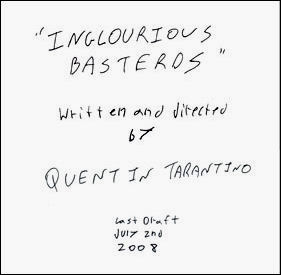
I’m apparently the only movie hound in the civilized world who hasn’t read Quentin Tarantino‘s 165-page script of Inglourious Basterds, which, according to a cover-page photo provided by the Vulture guys, is how Quentin spells it.
They’re reporting, in fact, that the misspelling of bastards “continues through the screenplay,” which suggests that QT “was writing really, really fast.” They’re being cute — I tend to be blunt. Isn’t “basterds” the spelling equivalent of “rite” (as in write), “resterrant” (as in restaurant) and “simputhetik” (as in sympathetic)?
One of three possibilities: (a) Tarantino is a borderline illiterate, (b) He’s having everyone off by pretending to be a retard, or perhaps pretending to be one of the retard soldiers in the piece, or (c) the Vulture guys are having us off. My money is on (a) but you never know.
The script is “definitely the ur-text of Quentin Tarantino’s career up to now,” Vulture proclaims. “It combines his love of old movies (war movies, Westerns, and even prewar German cinema), his attraction to powerful female protagonists, his love of chatter, and his willingness to embrace the extreme — visually and in his storytelling. (The flashbacks have particularly Tarantino-esque flourishes; a thought bubble pops out of a character’s head to introduce one while another is shot spaghetti-Western style.)
“All in all, it reads like Kill Bill meets The Dirty Dozen meets Cinema Paradiso.”

McWeeny, on the other hand, says it’s “The Guns of Navarone meets Malena meets Cinema Paradiso along with a ton of just stuff we don’t have references for. It does celebrate the possibilities within a cinematic universe and in many ways — it’s not a gigantic movie in anyway other than ambition.
“Much of the film takes place in Nazi-occupied Paris — and I couldn’t help it as I read the script, but to imagine actors like Gregory Peck, Ingrid Bergman, Paul Henreid, etc in these roles as opposed to a modern cast. That said and God willing, some brilliant studio will see that this isn’t a recreation of history, slavishly playing to graven memory of war, but a film. A work of pure imagination unleashed upon the cinematic setting of World War II.”
It’s presumed that Brad Pitt‘s character, if and when he signs to star in Basterds, will play a Tennesse redneck with a neck scar called Lieutenant Aldo Raine — obviously an allusion to ’50s B movie star Aldo Ray and his performances in Eisenhower-era war films like The Naked and the Dead, Men in War, Three Stripes in the Sun and Battle Cry.
All I know is that three script sources who’ve come through for me in the past have let me down. It hurts. It feels badly. Well, maybe later today.
Not A Problem
The AP reported this morning that US Airways will remove in-flight entertainment systems on domestic flights come November to save about $10 million annually in fuel and other costs. Spokesman Phil Gee explained that the 500-pound weight of movie systems (i.e., devices that generate video images for those back-of–the-seat screens) forces planes to use more fuel to get around the country. Presumably other carriers will be following suit.
Forget the 500 pounds and the bland in-flight movies with their Disneyworld editing standards and substitute dialogue. Just make it easier to get AC power for passenger computers, iPhones and iPods, and offer gratis broadband service to business and first-class and paid broadband to coach. Simple.
Third Screen Feed
It rambles, meanders and tap-dances for the sake of tap-dancing. But a smart 7.9 article by the Detroit Metrotimes‘ Ashley Lindstrom does specifically grapple with a big exhibition fear — i.e., that competition from the proverbial third screen (computers, Apple TV, iPhones, iPods) will hurt or kill big-screen venues. The answer, provided by NATO president John Fithian and a USC Digital Media Center report, is that this just isn’t happening.
“It would seem counterintuitive that an attention-deficit generation of instant-gratification addicts still makes up the majority of frequent moviegoers,” Lindstrom writes, “but Fithian recalls a 2007 study by the MPAA (Motion Picture Association of America) which shows that individuals who own or subscribe to five or more technologies (DVR, satellite TV, MP3 players, etc.) actually see about four more movies per year than, er, neo-Luddites.
In short, “the old wisdom that techies are by their very nature antisocial creatures is being challenged. For instance, the University of Southern California Digital Media Center’s 2008 report showed that internet users say they spend more face-to-face time with friends and family than nonusers.
“‘For [young people], this is just one more form of being pervaded by media,’ Fithian says, adding that many theaters are looking into rowdier, text-friendly auditoriums to serve their long-term welfare by meeting their youthful patrons’ desires– AMC’s Star Theatre in Southfield, anyone? — and additionally creating adult spaces for more challenging content. AMC offers its ‘AMC Select’ for, they tell us, ‘special films for select tastes,’ most of which are released regionally and occasionally screen in a Detroit-area AMC theater.
The result, says Fithian, is that theatres “are finally back on track after the 2005 slump, and that this year’s take — as of 6.13.08 — is only slightly under last year’s — the year of ‘threequels,’ Fithian interjects — and he fully expects to make up the difference in no time.
Fithian further points out that “the total number of U.S. screens actually increased in 2008, though the sum of theater locations has decreased, which he ascribes to older facilities being torn down and the erection of more modern multi-screened structures.”
Wait…”rowder, text-friendly auditoriums”? As in darkened auditoriums where you’re supposed to watch movies? Include me out.
Up and Down Twice
Arizona Daily Star critic Phil Villarreal on the four career phases of Eddie Murphy — fast track (’80 to ’88), downturn (’89 to ’95), rebound (’96 to ’98) and Murphy’s Law (’98 to ’08).
Birth of the Bat
Holy fruit salad! A recollection by “Reel Geezer” Lorenzo Semple, Jr. about banging out scripts for the old Adam West Batman TV series. “Days of innocence, days of Andalusian heaven!”
Old Stateroom
Where’s the other half of this classic scene? I can’t find it anywhere. This clip only shows a third of it, if that.
Groucho: “Tell me, stew — do they allow tipping on this ship?” Steward: “Yes, sir.” Groucho: “Have you got two fives?” Steward: “Oh, yes sir!” Groucho: “Well, then you won’t need the ten cents I was gonna give ya.”
Wee Hours
Night-before, post-midnight screenings of big summer movies are routine, but I was especially intrigued to hear about 6 am showings of The Dark Knight in this 7.9 N.Y. Times story by Michael Cieply.
One of the most vivid screenings of my life happened when I attended a 5 am showing of THX 1138, which was being shown as part of 24-hour science-fiction marathon. I was barely awake but felt very alive and open-pored. I had seen this George Lucas film at some funky-ass repertory theatre, and at a too-late hour if I correctly recall. I was okay with it after seeing it there. But the 5 am wake-up screening was a revelation in that I came out floored by THX 1138. Every little thing that Lucas intended, I got. Especially the humor.
I’ve been convinced ever since that the very early wee hours (following a few hours of sleep) are the best time to see a movie.
I’m going to keep checking Fandango, but if anyone hears about a 6 am Dark Knight screening in Los Angeles proper, please advise. Why haven’t I seen The Dark Knight in a regular press screening?
Red and White
I mentioned a similarity factor between Rebel Without a Cause‘s James Dean and King of Kings‘ Jeffrey Hunter a few years ago and had forgotten about it, but this 7.8 Burmashave comment reminded me of it: “Anybody ever think about James Dean playing Jesus if he’d lived, and how fucking crazy that would have been?”
King of Kings and Rebel were directed by Nicholas Ray, of course, so in a sartorial fashion Ray did sorta kinda cast Dean in his Bible movie. He did this by having Hunter wear a facismile of the iconic red jacket and white T-shirt get-up that Dean wore in Rebel. Variety critic Todd McCarthy reminded me this morning , in fact, that note that “Ray dressed Hunter in a robe of exactly the same shade of red as Dean’s Rebel jacket.”
The idea of Christ wearing a red robe had already been established in The Robe and Demetrius and the Gladiators, but think for a moment about the ludicrousness of a dirt-poor Jesus of Nazareth wearing a red cloak with a perfect white T-shirt garment underneath. It’s as if they had Gap and Banana Republic shops in old Jerusalem, and Jesus and his disciples occasionally shopped there.
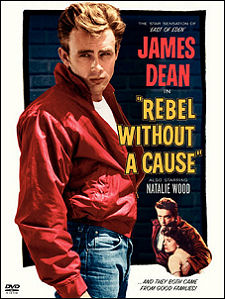
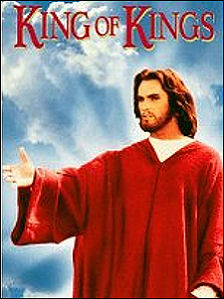
What if J.C. had hired a fashion consultant? “As you know, Nazarene, plain red works fine on every occasion, but — stop me if I’m overstepping — you need to present an extra stylistic distinction, something that says ‘this guy is special’ and not just some, whatever, shepherd or olive farmer or whatever, if you follow my drift. That’s why a white undergarment is such a good idea. And it comes with white briefs in case, perish the thought, you’re ever crucified, because the Roman guards will let you keep the briefs on. Or at least, they have with my other customers.”
“Everything you say about King of Kings is right,” Todd McCarthy wrote about my 7.8 posting, “but to me the most compelling aspect of the film it how political it is. The first whole section of the picture details the political situation in Judea at the time with almost documentary-like attention, and the script’s great and provocative gesture is to present Jesus and Harry Guardino‘s Barabbas as parallel revolutionaries — Jesus of a religious stripe and Barabbas as a political outlaw, which makes the ending ironic.
“In defining the major Jesus films of the ’60s-70s period, it’s fair to say that Stevens’ The Greatest Story Ever Told is the Protestant version, Zeffirelli’s Jesus of Nazareth is the Catholic version, Pasolini’s The Gospel According to St. Matthew is the Marxist version and King of Kings is the Zionist version.
“Of course Hunter is physically far too fair (and note the shaved armpits at the crucifixion), but he still manages to achieve a poignant purity as things move along. The score is one of Rozsa’s very greatest and crucial to covering over various narrative lurches and shortcomings. And, by the way, there are no known 70mm prints, so you can’t blame the Cinematheque for not delivering one.””
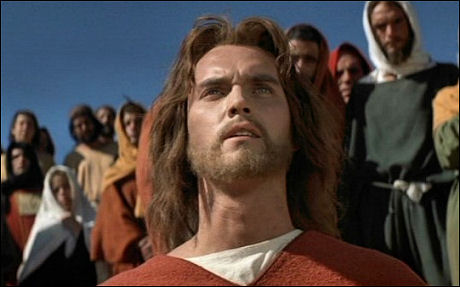
Montana Moment
Nice kids, Access Hollywood scooped…so what?
Feta Whoopee
Given David Poland‘s tendency to sound a little queeny and sometimes super-malleable when it comes to musicals, his 7.9 pan of Mamma Mia! is a significant thing. It’s also one of the funniest and best-written slams he’s ever posted on MCN.
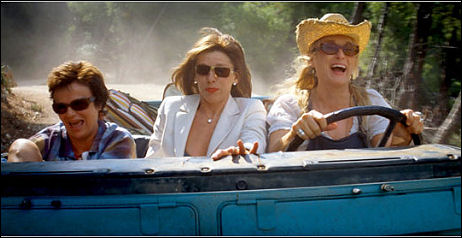
Other opinions will obviously add to the stew, but henceforth those who are determined to see this film with their friends and have a great time (i.e., the Sex and the City crowd) with a truly un-self-conscious girly-girl attitude are going to have to figure ways to keep themselves d & d between now and when they see it. So as not to permit discordant voices to, you know, muddle the experience.
“Hiring the stage director who doesn’t have the slightest idea how to shoot a movie and has no real understanding of why a movie is not simply the stage show on film,” Poland begins. “And this is, simply, why Mamma Mia! is a pretty terrible movie.
“Worse than Rent. Worse than Annie (a movie with three numbers that really work and an overall tone that does not). But it is one step better than the conversion of The Producers, as it is a jukebox musical and actually requires very little sophistication… just more than Phyllida Lloyd could deliver from behind a movie camera.
“I had a hard time getting a handle on what exactly they were going for with this melange of beautiful settings, terrible green screen (or whatever technique they used to leave massive lines around the actors’ heads when they were looking out onto the sea from the hotel), overt breaking out in song, 60-is-the-new-45 casting, big energy, little consistency, a stunning amount of obvious ADR-ed/dubbed dialogue scenes like we haven’t seen/heard in an American movie in a long, long time, and the bravest performance of Pierce Brosnan‘s career since anyone who sings like that choosing to expose himself to the public is daring indeed.
“After about 30 minutes, it hit me. They were making an AIP beach movie…Gidget Goes Grecian…How To Stuff A Wild Souvlaki…Marital Beach Party. It’s meant to be rollicking, cheesy, brain-dead good fun.
“I’m not kidding. There is a distinct filmmaking style that suggests that they looked at these films as a template. (Exec Producer Tom Hanks has also shown his interest in that period, including with his own directorial debut, That Thing You Do.) The problem is that the filmmaking doesn’t deliver on that either. Ms. Lloyd just doesn’t know what she is doing with the camera. She leaves some very talented people hanging in the breeze as she fails to understand the language of film and how to support the ideas of her actors’ performances with how she shoots the images.”
I wouldn’t be surprised if right now the Hollywood Reporter‘s Ray Bennett is out buying a fishing hat and dark shades and thinking about gassing his car in preparation for a trip to Mexico. He’s probably at least asking himself, “Is it nobler to stay in the States as my reputation as the guy who gave an enormous wet kiss to this film grows, or is it smarter to duck out now and wait until it all blows over?”
Full disclosure: Why haven’t I run my own review? Well, I showed up at last Monday’s screening at the Landmark (which I’d RSVP’ed to a couple of weeks prior) only to be told that Universal publicists didn’t want me to see it. So I guess I’ll just wait until July 18th to (a) confirm my suspicions or (b) fall surprisingly in love, or (c) arrive at some in-between place.
Foodie
When it comes to slicing and dicing, restaurant critics seem to be better at their particular field — writing with more emotion, using more elegant phrasings — than many film critics are at panning movies. More fun to read, at least. One reason is that restaurant critics are a lot more Anthony Lane-ish than, say, Kenny Turanny or Mick LaSalle-like. The better ones put forth a mixture of effete snobbery and saying it plain and straight (like Alan Ladd‘s Shane dialogue), describing their run-ins like a good sports writer or war correspondent but with slight sprinklings of haute.

Lower Manhattan’s Ago
I was thinking this over yesterday as I read three withering reviews of the downtown Manhattan branch of Ago, which opened early last month. I read them because the West Hollywood Ago, which has been around for a good ten years or so, is only three blocks from where I live, and because I’ve eaten there two or three times and had….well, a pretty good time.
This is the place, remember, where Quentin Tarantino and Don Murphy had their celebrated lunchtime fisticuffs, or rather where Tarantino went all Mike Tyson on Murphy and Murphy (if I recall the news accounts) did a Muhammad Ali rope-a-dope.
In any event, N.Y. Times critic Frank Bruni despises the Manhattan Ago for not being “in the hospitality business [as much as] the attitude business, projecting an aloofness that permeated all of my meals there, nights of wine and poses for swingers on the make, cougars on the prowl and anyone else who values a sort of facile fabulousness over competent service or a breaded veal Milanese with any discernible meat.”
He begins by describing himself and a friend waiting at the bar from an 8:30 p.m. reservation that wasn’t ready by 8:51, “when the great wave of white wine crashed over [the bar].
“I’m talking about the Poseidon Adventure of wine spills. Shelley Winters could have done the backstroke in it. I’m not sure how the bartender set it in motion, and neither was he. He kept marveling at its fury and aftermath: my friend’s wine-splashed chin, her wine-soaked skirt, her wine-sopped entirety.”

ditto
GQ’s Alan Richman wrote last month of a meal for four at Ago, which didn’t begin until 10 pm due to the crowds. “At 11:45 p.m., having spent exactly $100 per person, tip not included, on food and a single bottle of wine, my friends sat stunned. They are both restaurateurs from the South, and they couldn’t believe dining in New York had come to this.”
Then the waiters started in on standard search-and-destroy procedures — i.e., grabbing everything they can off a table in order to scoot the customer out so they can close up. Boom! — a water glass snatched. Wham! — a candle taken away. “We took the hint and got up to leave,” Richman writes. “At that point service improved markedly. The maitre d’ ran outside to flag down a cab, anxious to see us on our way.”
In a 7.7. piece, The New Yorker‘s Lauren Collins called Ago “the most cynical Californian export since Euro Disney.” She saw it as lacking in class. She complained about its “lurid cocktails” (a blue Martini that “isn’t fit for a Smurf”) and exhibitionist patrons (i.e., “a couple [making] out with an athleticism, and a sense of privacy, more often associated with sandy beaches on desert islands”).
I can relate to this. I was once kicked out of a bar for making out with a girlfriend, so don’t tell me. Nothing destroys the allure of a presumably hot and happening restaurant more than common or crude behavior from the customers.
This lesson was impressed upon me very strongly about 25 years ago at an Italian restaurant on upper Columbus Avenue, not too far from the Museum of Natural History. It had just opened and been written about in a couple of publications, so I popped in one night for a quick one and to look at the menu. I eventually spoke to a waiter about this and that, and he pointed out that the owner was celebrating the opening of the place with a large group of friends and family. I looked over and there they were — 15 or so at a big table, raising glasses and being way too loud. They looked like New Jersey Italians.
I went downstairs to the bathroom, and as I was washing my hands one of the owner’s friends or family members — a big tall guy with a moustache — came in and went straight for the urinal and loudly belched, loudly farted and took a leak at precisely the same instant. Boom-boom-bam! And then he went “aaahhhh!” like a grizzly bear having an orgasm. And then he snorted.
Now, I’m as human as the next guy and so I try not to look down my nose at people, but this guy, I decided then and there, was a total animal. And I said to myself, if the owner has beasts in his family or among his friends, then he too must be a belching and farting peon on some level, and this will come out in different ways in the running of his business, and sooner or later the restaurant will close. Probably sooner. I decided all this less than 30 seconds after the show in the bathroom.
Four to six months later, the place had indeed closed. I’m not making this up.

